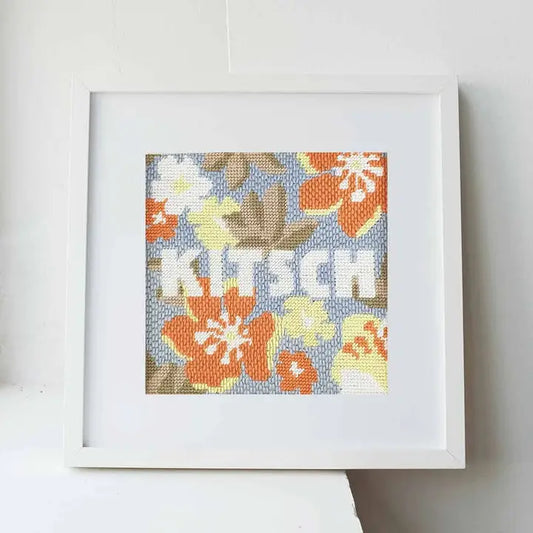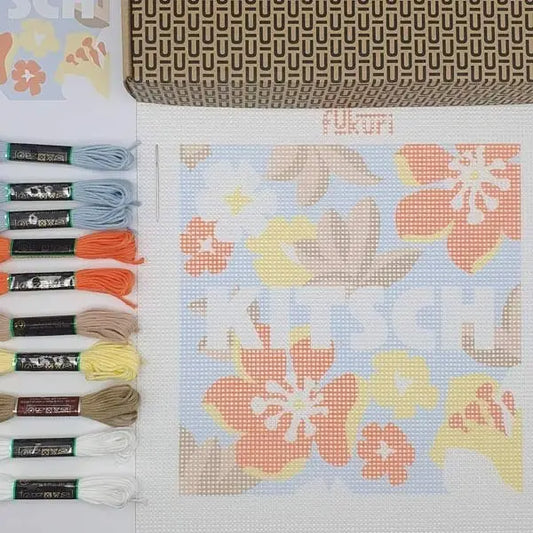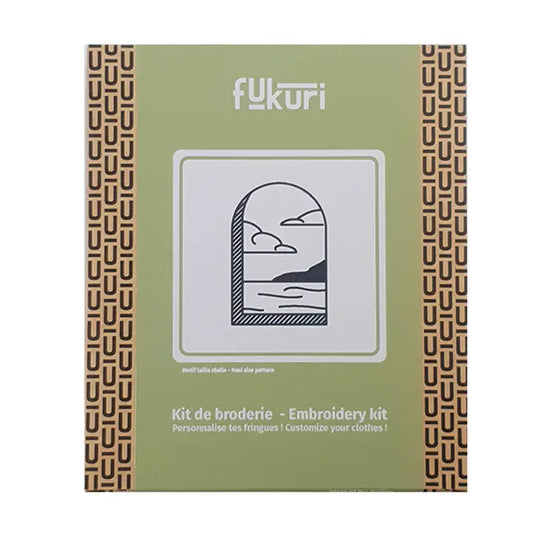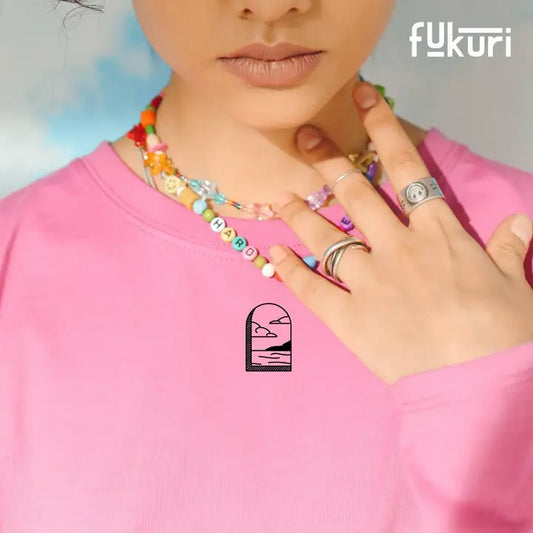Collection: Cross stitch embroidery
Welcome to our exclusive collection dedicated to the fascinating world of cross-stitch embroidery. At Joy!, we celebrate the harmony between tradition and modernity , offering you a diverse range of embroidery kits designed to awaken your creativity and enrich your artistic experience.
Whether you're a long-time enthusiast or new to the colorful world of embroidery , our collection has been carefully selected to meet all skill levels. From classic patterns to contemporary designs, each kit is an invitation to explore the art of embroidery , express your personal style and create works that reflect your passion and finesse.
-
DIY HABERDASHERY - My astro embroideries
Vendor:LA PETITE EPICERIERegular price €24,99Regular priceUnit price / per -
Canvas Kit - DIY - WILD
Vendor:FukuriRegular price €49,90Regular priceUnit price / per -
Canvas Kit - DIY - WILD
Vendor:FukuriRegular price €49,90Regular priceUnit price / per -
Canvas Kit - DIY - Hearts Stamp
Vendor:FukuriRegular price €49,90Regular priceUnit price / per -
Canvas Kit - DIY - PLAY Leopard
Vendor:FukuriRegular price €49,90Regular priceUnit price / per -
Canvas Kit - DIY - PAUSE Leopard
Vendor:FukuriRegular price €49,90Regular priceUnit price / per -
Canvas Kit - DIY - Leopard
Vendor:FukuriRegular price €49,90Regular priceUnit price / per -
Canvas Kit - DIY - KITSCH
Vendor:FukuriRegular price €49,90Regular priceUnit price / per -
Canvas Kit - DIY - KIFF
Vendor:FukuriRegular price €49,90Regular priceUnit price / per -
Canvas Kit - DIY - CRUSH
Vendor:FukuriRegular price €49,90Regular priceUnit price / per -
Canvas Kit - DIY - I DO MYSELF GOOD - Square
Vendor:FukuriRegular price €49,95Regular priceUnit price / per -
Embroidery Kit - DIY - Horizon view
Vendor:FukuriRegular price €24,95Regular priceUnit price / per -
Embroidery Kit - DIY - Mountain View
Vendor:FukuriRegular price €24,95Regular priceUnit price / per -
Embroidery Kit - DIY - Bright Blue Hearts Stamp
Vendor:FukuriRegular price €24,95Regular priceUnit price / per -
Embroidery Kit - DIY - Nippon Daruma
Vendor:FukuriRegular price €24,95Regular priceUnit price / per -
Embroidery Kit - DIY - Kawaii bubble tea
Vendor:FukuriRegular price €24,95Regular priceUnit price / per -
Embroidery Kit - DIY - Kawaii Avocado
Vendor:FukuriRegular price €24,95Regular priceUnit price / per -
WILD STRAWBERRY PARTIAL EMBROIDERY KIT Graine Créative
Vendor:GRAINE CREATIVERegular price €22,95Regular priceUnit price / per -
PARTIAL EMBROIDERY KIT BOUQUET Graine Créative
Vendor:GRAINE CREATIVERegular price €22,95Regular priceUnit price / per -
PARTIAL EMBROIDERY KIT PARIS Graine Créative
Vendor:GRAINE CREATIVERegular price €22,95Regular priceUnit price / per -
PARTIAL EMBROIDERY KIT VEGETABLE GARDEN
Vendor:GRAINE CREATIVERegular price €24,95Regular priceUnit price / per -
PARTIAL EMBROIDERY KIT CAT MASK
Vendor:GRAINE CREATIVERegular price €16,95Regular priceUnit price / per -
Wild Lion Partial Embroidery Kit
Vendor:GRAINE CREATIVERegular price €16,95Regular priceUnit price / per -
PARTIAL EMBROIDERY KIT FLYING RABBIT
Vendor:GRAINE CREATIVERegular price €16,95Regular priceUnit price / per
-10% on your order!
Subscribe to the newsletter and receive a 10% promo code!
Video tutorial to learn cross stitch embroidery step by step:
Your questions about our cross stitch embroidery kits:
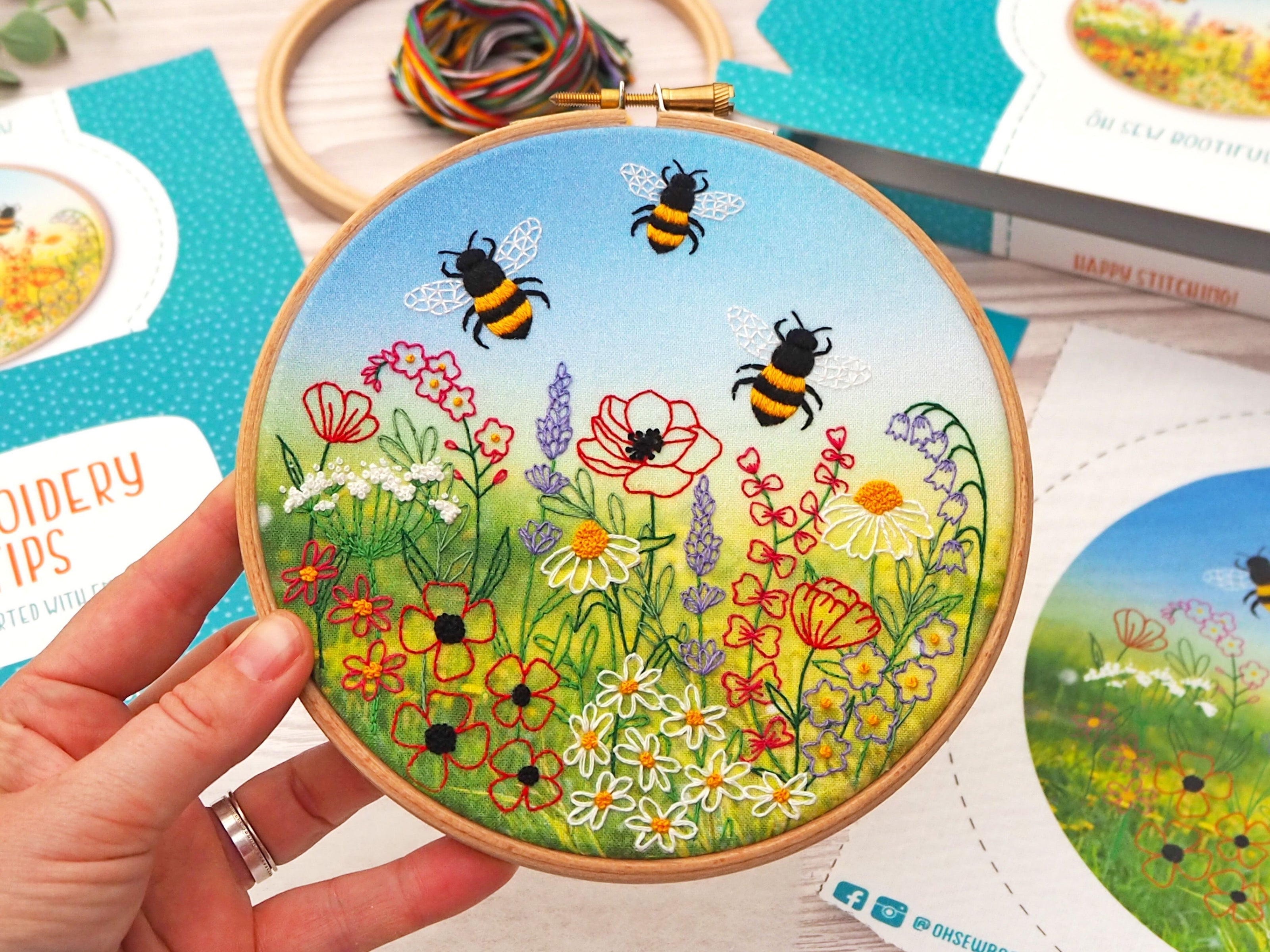
What is cross stitch embroidery?
Cross-stitch embroidery is a form of textile art where you use X-shaped stitches on a regular weft canvas to create designs. Popular for its simplicity and versatility, it allows you to create a variety of designs, from detailed images to decorative text, using different colored threads.
How to choose a cross stitch embroidery kit suited to your level?
Choosing a cross stitch embroidery kit depends on your experience and comfort with embroidery techniques.
For beginners, we recommend kits with clear instructions and simple patterns. These kits generally contain larger designs with less fine detail.
For intermediate and advanced embroiderers, opt for kits with more complex designs and varied techniques. Also make sure the kit contains all the necessary materials, such as thread, needle and canvas.
What are the advantages of cross stitch embroidery?
Cross-stitch embroidery offers multiple benefits. It stimulates creativity, improves concentration and can be extremely relaxing, reducing stress.
It's also a great way to personalize items and create unique gifts . Technically, cross stitch is easy to learn and allows for precise, detailed designs , making it a rewarding activity for people of all ages.
What advice can you give to cross stitch beginners?
If you 're new to cross-stitch embroidery, start with simple designs and use Aida fabric , which is easy to work with. Take the time to familiarize yourself with the different types of threads and stitches.
Read the instructions that came with your box carefully, and be sure to watch online tutorials for additional guidance.
Remember that patience and practice are essential; don't be discouraged if your first projects aren't perfect.
How to maintain and preserve your cross-stitch embroidery paintings?
To preserve your cross-stitch embroidery paintings , avoid exposing them directly to sunlight to prevent fading. Gently hand wash your embroidery with mild detergent and lukewarm water, then lay flat to dry. Iron them inside out to avoid flattening the stitches. To store them, wrap them in tissue paper or cotton cloth to protect them from dust and wrinkles. If possible, avoid folding your embroidery; prefer to roll them or store them flat.
How to frame a cross stitch embroidery?
- After washing and gently ironing your embroidery , choose a frame with suitable dimensions .
- Stretch the fabric on a thin cardboard to the same dimensions as the frame, hold with adhesive tape .
- Slide the assembly into the frame and close.
- You can add a mat for a professional look.
The ideal is to use a frame with glass to protect your embroidery.
How to wash cross stitch embroidery?
You can wash your embroidery in warm, soapy water to remove fingerprints and revive the colors.
Use a mild soap, such as Marseille soap. Do not rub.
Rinse gently with clean water until clear.
Gently stretch your embroidery so that it regains its shape then leave to dry flat on a towel, away from direct sunlight so as not to alter the colors.
How to enlarge a cross stitch embroidery?
To embroider a larger pattern, you need to recalculate the number of stitches in the grid based on the fabric you will be using.
For example, if your pattern is 50x70 stitches on a 5 count canvas (i.e. 10x14 cm), it will be 100x140 stitches on an Aida 7 count canvas (i.e. 14x20 cm).
You can use software or an app (like Cross Stitch Saga) to edit the grid easily.
How to calculate the measurements of a cross stitch embroidery?
To know the final dimensions of your embroidery, count the number of stitches in width and height on the grid (e.g.: 60 x 80 stitches).
Divide each measurement by the number of stitches per cm of your canvas.
On a 5.5 stitches/cm Aida fabric, your embroidery will be approximately 11x15 cm (60/5.5 = 10.9 and 80/5.5 = 14.5).
Add a few cm margin for finishing.
How to start the first cross stitch on embroidery?
After cutting a strand of suitable length (approx. 50 cm), separate it in 2 and thread your needle. Make a knot at the end, on the back of the work. Plant your needle on the right side and pull until the knot stops. Bring the needle out a few stitches further and insert it back into the first hole to make a small loop that will block the thread. Your first stitch is ready to be embroidered! You can also use a colored backstitch to start.
Learn more about cross stitch embroidery
-
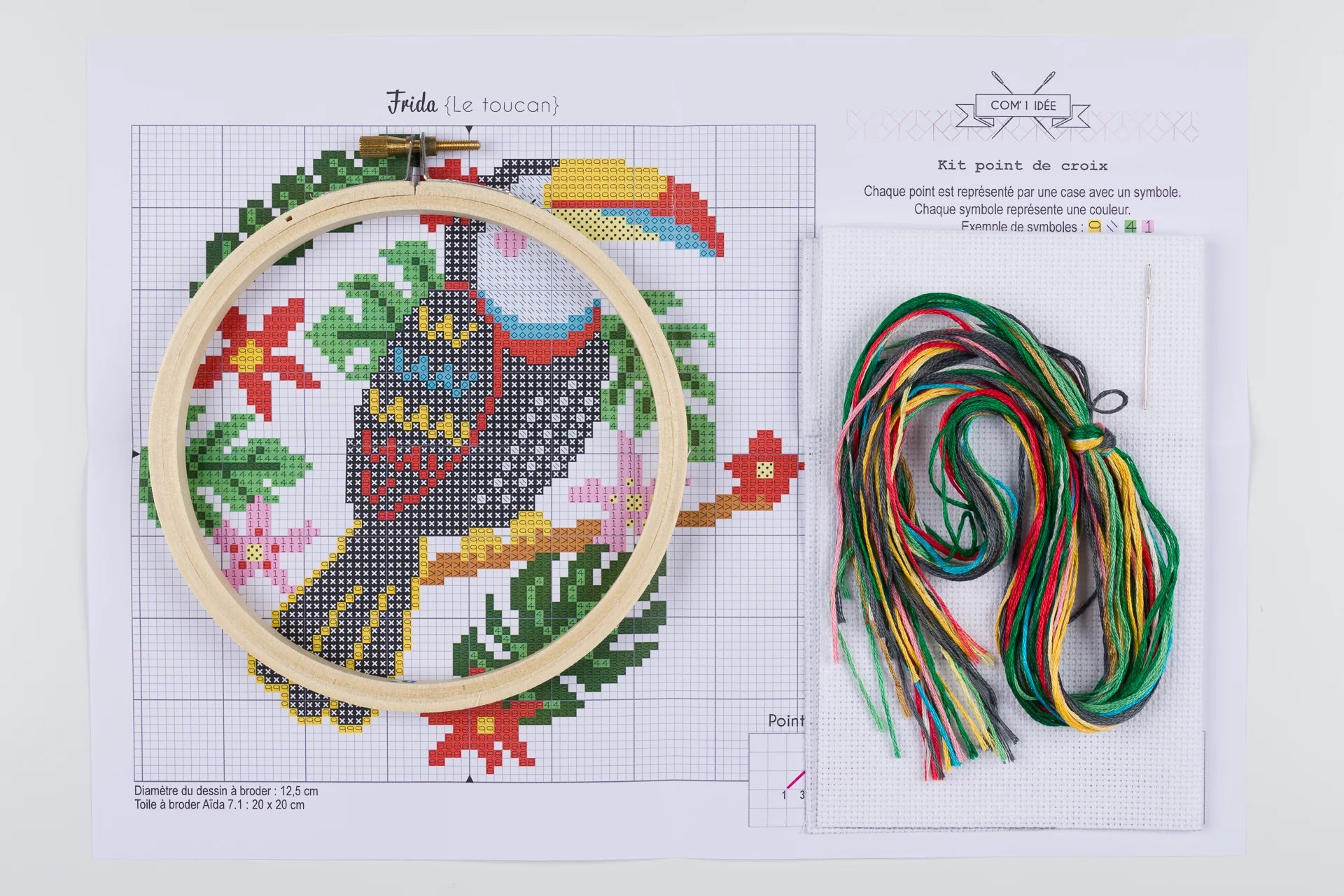
Origin of cross stitch embroidery
Cross-stitch embroidery is an ancient art form, the first traces of which date back to the 6th century AD in Asia . It quickly spread to Europe, where it was adopted in monasteries to decorate liturgical vestments and draperies . Over the centuries, this technique became more popular, becoming a popular pastime in homes, particularly during the 19th century. Today, cross-stitch embroidery is loved for its simplicity and beauty , allowing you to create detailed and colorful works of art.
-
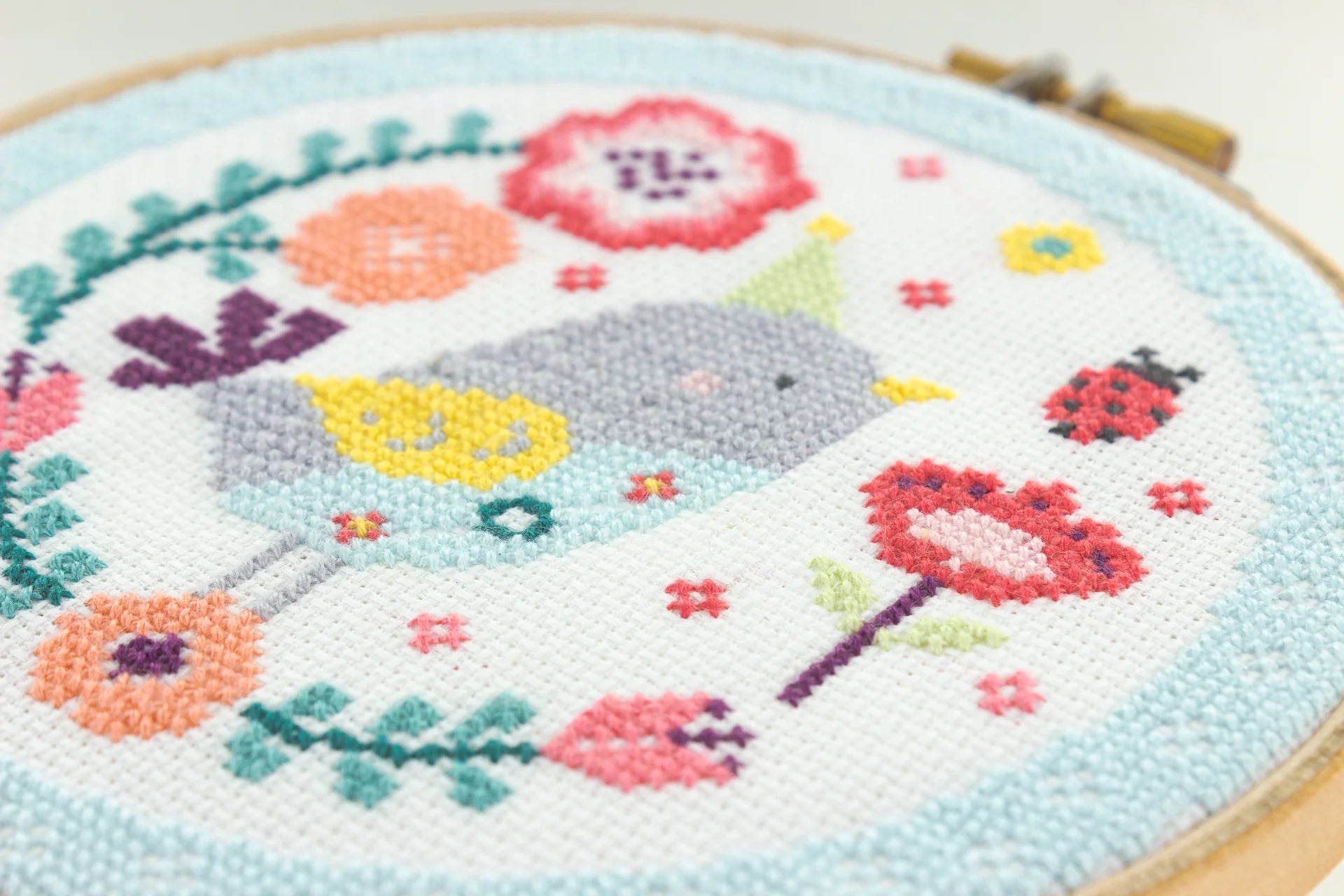
Current trends in the world of cross stitch
Cross-stitch embroidery is experiencing a modern revival, with trends that include the use of modern patterns and the integration of new techniques and materials.
Today's embroiderers love to mix traditional styles with modern elements, creating unique pieces that reflect their personality. Social media and online platforms have also played a key role in spreading this trend, allowing artists to share their designs and inspire a new generation of embroiderers.














